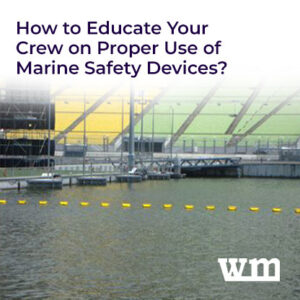
Marine safety devices are not just about maintaining formalities; they're essential to the very core of marine navigation. In the vast and stunning ocean lie unpredictable dangers and harsh conditions, which can make your marine experience disastrous in the blink of an eye. That’s why following strict safety protocols is crucial for protecting lives, the environment, and the vessel itself.
Mariners face a myriad of challenges when navigating the high seas, from dealing with extreme weather and high winds to managing equipment failures and navigation errors. For new crew members joining a vessel, the faster they learn their responsibilities, the better they are able to deal with difficult situations. As a mariner, it’s essential to train your crew about marine safety equipment (both on board and at sea) and crucial vessel details to avoid hazards due to negligence.
Here are a few things you need to educate your new crew members:
Training in personal safety and health focuses on mastering proper lifting techniques, using personal protective equipment (PPE), upholding hygiene standards onboard, and preventing slips, trips, and falls. This essential training keeps mariners safe and well during everyday tasks.
Fire hazards can be dangerous for vessels even in the ocean. Training in fire prevention, firefighting techniques, operating fire fighting equipment, and running fire drills is key to handling emergencies effectively and stopping fires before they start. Explain to your teammate the location of the fire extinguisher and other marine safety devices.
Survival training covers how to use life-saving gear like life jackets, lifeboats, and life rafts. It includes launching procedures, surviving at sea, basic navigation, and search and rescue tactics.
Basic first aid and medical training are vital for maritime workers to manage medical emergencies and offer immediate help to injured or ill crew members until professional medical aid is available.
Mariners need thorough training in navigation so they can understand nautical charts, operate radar, use electronic navigation systems such as GPS, and other marine safety equipment to avoid collisions even if navigating through unknown waterways.
It's a training program to prepare your crew members to tackle various emergencies, including man-overboard situations, grounding, pirate threats, severe weather, and other critical incidents. It involves crafting contingency plans, running emergency drills, and communicating effectively during crises.
With advancing technology, maritime workers need training to operate, maintain, and troubleshoot modern machinery, propulsion systems, and automation onboard contemporary vessels.
Navigating in the high seas can be challenging, but with the right equipment, it can become safer and more comfortable. Wealth Marine Pte Ltd. offers the best marine equipment supplies in Singapore. Shop today!
Note: This article is for reference only. Any copyright issues or intellectual property related matters (if any are involved and not made known to Wealth Marine), such accountability and responsibility shall be passed on to the writer of the articles.